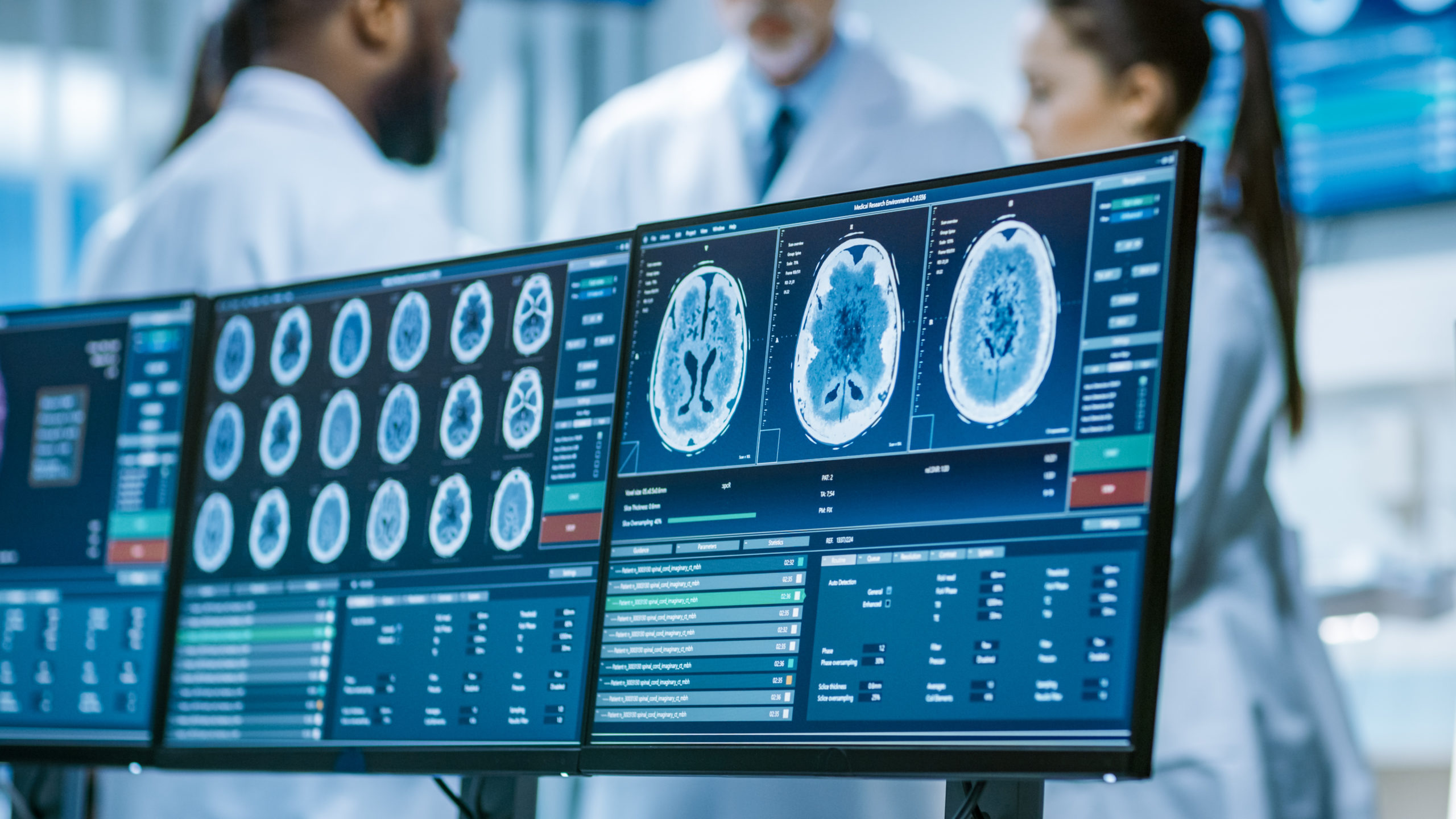An Alternate Treatment for Parkinson’s Disease
Though Parkinson’s disease is progressive, MeRT® (Magnetic e-Resonance Therapy) can help to delay progression and see improvements in symptoms.
The Brain Treatment Center in San Diego Now Offers This State-of-the-Art Treatment
Parkinson’s disease causes specific neurons in the brain to break down and die. Symptoms of this happen because of the loss of neurons in the brain that produce a chemical called dopamine. Once dopamine begins to decline, it causes abnormal brain activity, which causes Parkinson’s Disease. Unfortunately, there is no cure for Parkinson’s, but there are medications and treatments that can improve symptoms and slow progression. Our treatment is non-invasive, pain-free, and non-pharmaceutical. You do not need to stop any other therapies or discontinue the use of the drugs you are already taking. MeRT is an adjunct treatment that can help with symptom management and help slow progression.

Call Our New Patient Coordinator to Learn More
(619) 255-2101
Or Fill in the Form Below and She Will Contact You at Your Convenience!
Symptoms of Parkinson’s Disease
The symptoms of Parkinson’s can vary based on how long you’ve had the disease and how much the disease has progressed. An overview of possible symptoms includes:
The most common symptom is tremors. These usually start in the hands and can progress to the limbs, even when the body is at rest.
- Muscles become rigid, which limits movement anywhere in the body, and this symptom can also cause pain.
- Movement becomes more difficult and slows, making easy tasks more time-consuming and difficult. Walking becomes disjointed and simple, and everyday tasks such as going to the bathroom or getting out of a chair can take much more time.
- Balance issues.
- Posture becomes more stooped.
- Automatic movements such as blinking or smiling decrease.
- Speech can be affected. Speaking in a monotone voice, slurring, or talking faster or slower is common.
- Writing becomes more difficult.
- Symptoms such as depression, fear, and anxiety can accompany Parkinson’s. MeRT helps with these types of symptoms as well.
- Circadian rhythms become disrupted; you may find yourself sleeping more during the day and/or having insomnia at night.
- Difficulty urinating or incontinence.
- Generalized fatigue.
- Constipation occurs more because of slowed digestion.
- Blood pressure can fluctuate with movement, such as a sudden drop when going from a position of sitting to standing.
- Sense of smell can be affected as the body may not be able to identify some odors.
- Pain in various areas of the body can be specific or generalized.
- Cognitive problems can occur, such as dementia and hallucinations. This particular type of dementia is called Lewy Body Dementia and is caused by the disease. This usually happens in the later stages of the disease.
- Eating, chewing, and swallowing become more difficult as the disease progresses due to slowed muscle movements.
- Breathing problems can also become more prevalent as Parkinson’s progresses.
- Sexual dysfunction.
Causes of Parkinson’s Disease
Researchers have identified specific genetic changes that can cause Parkinson’s disease. But these are uncommon except in rare cases with many family members affected by Parkinson’s disease. However, certain gene variations appear to increase the risk of Parkison’s disease but with a relatively small risk of Parkinson’s disease ffor each of these genetic markets. Environmental triggers such as exposure to certain toxins or environmental factors may increase the risk of later Parkinson’s, but the risk is small.
Researchers also have noted that many changes occur in the brains of people with Parkinson’s disease, although it’s not clear why these changes occur. These changes include:
- The presence of Lewy bodies. Clumps of specific substances within brain cells are microscopic markers of Parkinson’s disease. These are called Lewy bodies, and researchers believe these Lewy bodies hold an important clue to the cause of Parkinson’s disease.
- Alpha-synuclein found within Lewy bodies. Although many substances are found within Lewy bodies, scientists believe that an important one is the natural and widespread protein called alpha-synuclein, also called a-synuclein. It’s found in all Lewy bodies in a clumped form that cells can’t break down. This is currently an important focus among Parkinson’s disease researchers. Researchers have found the clumped alpha-synuclein protein in the spinal fluid of people who later develop Parkinson’s disease.”
Until very recently, there was no specific test to diagnose Parkinson’s. Patients see a neurologist and undergo testing as a process of elimination. Several drugs belonging to the same class have been shown to be very helpful, though there is still no cure.
The Mayo Clinic also indicates:
However, a new test may be on the horizon. Researchers are studying a Parkinson’s test that can detect the disease before symptoms begin. The test is called an alpha-synuclein seed amplification assay. In a 2023 study, researchers tested the spinal fluid of more than 1,000 people to look for clumps of the protein alpha-synuclein. Alpha-synuclein is found in Lewy bodies. It forms clumps that the body can’t break down. The clumps spread and damage brain cells.
Alpha-synuclein clumps are a hallmark sign of Parkinson’s disease. The test accurately identified people with Parkinson’s disease 87.7% of the time. The test also was highly sensitive for detecting people at risk of Parkinson’s disease.
This study of the alpha-synuclein seed amplification assay was the largest so far. Some researchers say the study may be a game changer for Parkinson’s disease diagnosis, research and treatment trials. But larger studies are needed. There’s hope among researchers that in the future, the test could be done using blood samples rather than spinal fluid.
We do know that Parkinson’s disease typically affects the elderly population more than younger people. Also, some patients may develop resistance to the medications they are taking.
MeRT and Parkinson’s Disease

MeRT is an emerging technology that aims to improve brain function and communication. The TMS equipment used is FDA-cleared to treat Major Depressive Disorder and OCD and is used off-label to treat a wide variety of neurological conditions.
While we utilize TMS technology, our treatment is more precise because we use a quantitative electroencephalogram (qEEG) to determine the exact dysregulation occurring in your brain. This data is sent to our team of brain scientists and physicians to formulate a treatment protocol that is tailored exactly for you based on frequency, location, and power used.
TMS, in and of itself, is more of a one-size-fits-all approach. TMS does not include a qEEG or any type of diagnostics, so it’s impossible to tailor treatment specifically for you. Our treatment modulates the brain’s electrical activity. This is done by using magnetic fields which pass through the scalp from an electromagnetic coil.
MeRT is a gentle form of neuromodulation. It is painless, and you do not need to be sedated to go through your treatment sessions. It is also non-pharmaceutical.
** For most conditions, MeRT should be done for six weeks to reach optimal results and be long-lasting. Because Parkinson’s disease is progressive, without a “maintenance program” after the initial treatment duration, it will lose its effectiveness. Depending on your individual results after the initial round of treatment, you and your provider will meet to discuss an ongoing maintenance program so you do not lose the gains that you’ve achieved.
How Do I Know…
Is MeRT the Right Treatment?
We understand that MeRT is a relatively new cutting-edge treatment. You may not be certain if it is right for your situation, but this is not a decision that needs to be made right away or alone.
Your first step would be a simple phone consultation with our New Patient Coordinator. At this time, you can discuss your symptoms and history, ask all the questions you want, and have her explain the protocols, fees, and details of treatment.
Testing and Evaluation
If you are interested in taking the next step in seeing if MeRT treatment is right for you, we can set up an appointment to perform an EEG (a simple, painless, and non-invasive brain scan).
This qEEG (quantitative EEG)/EKG test is used to evaluate brain activity and will show us any dysfunction or communication issues that are occurring. A qEEG is sometimes referred to as a “brain map” as it shows the exact areas of the brain that are experiencing dysfunction. This tool is valuable as it allows us to customize treatment specifically for YOU. This test is performed by our chief neurotechnician and takes approximately 45 minutes. We will also gather your new patient paperwork at this time and get you scheduled for your initial assessment period of treatment.

During your consultation, Kayleigh will answer any questions you may have and discuss your applicable treatment plan. Additionally, you will have an opportunity to meet with our physician and Medical Director, Julie Kim, M.D., who will oversee your treatment.
Assessment Period
We recommend six weeks of treatment for patients undergoing MeRT to achieve optimal and long-lasting results. However, prior to committing to the six weeks, we have each patient go through an assessment period of treatment to see how they will respond. This assessment period is included in the six weeks of treatment.
The assessment is two weeks long. It consists of ten treatment sessions, followed by a repeat qEEG. Treatment would be provided the first week, Monday through Friday, and the following week, Monday through Thursday. A typical treatment session lasts about 30-45 minutes.
Additionally, your provider will review the follow-up qEEG results with you.
If clinical changes are occurring as they should, and the qEEG also shows progress, then you would then continue treatment, which would occur five days per week, Monday through Friday. Generally, you will begin to feel the benefits of treatment within a week or two, but because treatment is cumulative, should continue to note improvements throughout the course of your treatment, and even for some weeks after treatment.
Because treatment is consecutive, you must be able to stay in or around the area while undergoing your therapy. If you have Parkinson’s disease, after you finish your initial round of treatment, maintenance visits will be required. This is because Parkinson’s disease is progressive. Treatment will not occur as often, but in order not to lose any gains, your provider will discuss a maintenance program. There is no obligation to continue treatment. The decision to do so is personal, and we will provide you with guidance based on your results.
Additional Treatment Options
For those who are not ready to commit to an assessment period or if we need to see the testing results to confirm that MeRT can help, we also offer the option of coming in for a qEEG/EKG and then having a consultation with Kayleigh and/or Dr. Kim to go over the results. After your clinical consultation, you will still have the option of going through an assessment period, should you choose to do so.
Improvements and results of MeRT are based on strict and active observation of our treatment protocols. Results may vary based on each person and are not guaranteed.
Because each person’s brain and condition are unique, we customize treatment protocols specifically for each individual guided by the qEEG results. Repeat qEEGs and clinical consultations occur every two weeks throughout treatment. The effects of treatment generally last a lifetime, though some folks do prefer occasional follow-up treatment as needed.
During your treatment session, you will sit in a comfortable chair while the neuro technician administers this gentle treatment with a hand-held magnet held near the scalp. While you may feel a slight sensation during treatment, it is not painful or uncomfortable. Magnetic pulses are delivered for six to eight seconds during each minute of treatment.
Also, it’s important to note that the potential side effects of treatment are minimal and should start to dissipate after you begin to progress through treatment.
Insurance
We are an in-network provider with TRICARE. If you have TRICARE insurance, it is possible that your policy may provide coverage for you or a family member, depending on your specific policy and condition. Our New Patient Coordinator can discuss this with you in further detail.
For all other insurance, we are considered out-of-network and cannot file insurance on your behalf. We can, however, provide you with the appropriate paperwork at the end of your treatment. Then, you can submit it to your insurance company to see if they will reimburse you.
Currently, rTMS is only FDA-approved for Depression and OCD (Obsessive Compulsive Disorder). For non-FDA-approved treatment, it is not likely that insurance will provide reimbursement for our protocols.
Some patients have reported that they have been able to receive some reimbursement for EEGs or clinical evaluations. However, this depends on their health coverage. Additionally, Medicare patients have reported that their coverage provides no reimbursement for MeRT.
We take all major credit cards, including Visa, MasterCard, American Express, and Discover.
Care Credit
Care Credit is also an option to help finance medical expenses and is a separate company from The Brain Treatment Center San Diego. This is a credit card you can use to cover medical expenses and services. They typically offer zero-interest financing for 12 months.
Usually, when you go to the Care Credit website and apply, they will quickly let you know if you receive approval.
 Interested but not sure?
Interested but not sure?
Talk with our New Patient Coordinator
It’s normal for patients and their families affected by neurological conditions to feel frustrated and isolated. Many have lost hope that treatment can improve the condition.
We understand what you may be going through. Yet, MeRT has helped patients restore their brain function, reclaim their lives, and feel passionate about living again. That’s why we want to help guide you through the process so that you can make an informed decision about whether MeRT is the right treatment for you or your child.
It costs nothing to call us and discuss what is happening. Our New Patient Coordinator is here for you. She understands your pain and can answer all your questions. Additionally, she can explain the process and protocols, costs, possible insurance benefits, and any other details you want to know. There are no obligations, and she will take the time you need to decide whether to take the next steps.
Call Our New Patient Coordinator to Learn More
(619) 255-2101
Or fill in the form below and she will contact you.
Contact Us
For more information or to speak with our New Patient Coordinator, please fill in the information below.
Contact Us
For more information or to speak with our New Patient Coordinator, please fill in the information below.

 The most common symptom is tremors. These usually start in the hands and can progress to the limbs, even when the body is at rest.
The most common symptom is tremors. These usually start in the hands and can progress to the limbs, even when the body is at rest. Interested but not sure?
Interested but not sure?